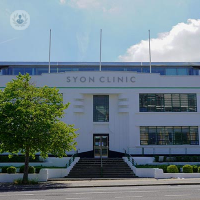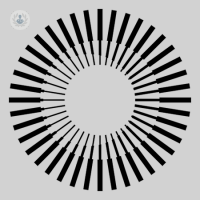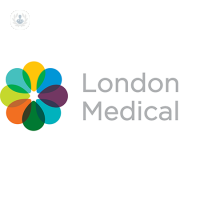What is an intravitreal injection?
An intravitreal injection is form of administering treatment for various eye disorders, such as macular degeneration. Treatment usually consists of using anti-VEGF drugs (which prevent the development of new blood vessels), immunosuppressive agents or anti-inflammatory drugs.

What are intravitreal injections for?
Intravitreal injections can decrease the progression of a number of visual disorders, including:
- Wet age-related macular degeneration (and in the near future, dry age-related macular degeneration)
- Diabetic maculopathy
- Retinal vein occlusion
- Macular oedema
What does an intravitreal injection involve?
An intravitreal injection is done under local anaesthetic, administered via eye drops, in an out-patient operating theatre. A speculum is usually used to keep the eyelids still and to decrease the tendency to close your eyes. In my own practice, I usually ask the patient to look away from the site of the injection. The procedure is extremely quick, only a few seconds, and the patient will only feel a slight discomfort.
Medicine is injected into the vitreous humour – the clear gel that fills the eye between the lens and the retina (the back of the eye). The injection administers the drug locally, fighting the eye disorder more effectively.
Potential risks arising from this procedure include retinal damage, inflammation within the eye, floaters, bleeding, infections, and in very rare cases, visual loss.
How can I prepare for an intravitreal injection?
Before getting started on intravitreal treatment, you should tell your doctor about any risk factors, for instance, if you’re suffering from any heart problems or if you've had any recent eye infections. Otherwise, no special preparation is required.
Post-operative process
After the procedure, you can go back to your daily routine fairly quickly, with vision recovery within 24 hours and occasionally some irritation or bruising for a few days. There is usually no need for post-operative drops.
Patients usually come for a check up and possible repeat injection at 1-2 week intervals. With Faricimab (Vabysmo) recent trials suggest an increased chance of extending treatment interval to 4 months.
Dry age-related macular degeneration
Intravitreal injections have recently been developed for dry age-related macular degeneration. This exciting new class of medicines block a form of inflammation in the eye caused by the complement pathway. Pegcetacoplan (Syfovre) is the first effective treatment demonstrated to decrease the rate of visual loss in the previously untreatable dry form of the disease.
02-09-2016 09-19-2023Intravitreal injection
Mr Vaughan Tanner - Ophthalmology
Created on: 02-09-2016
Updated on: 09-19-2023
Edited by: Sophie Kennedy
What is an intravitreal injection?
An intravitreal injection is form of administering treatment for various eye disorders, such as macular degeneration. Treatment usually consists of using anti-VEGF drugs (which prevent the development of new blood vessels), immunosuppressive agents or anti-inflammatory drugs.

What are intravitreal injections for?
Intravitreal injections can decrease the progression of a number of visual disorders, including:
- Wet age-related macular degeneration (and in the near future, dry age-related macular degeneration)
- Diabetic maculopathy
- Retinal vein occlusion
- Macular oedema
What does an intravitreal injection involve?
An intravitreal injection is done under local anaesthetic, administered via eye drops, in an out-patient operating theatre. A speculum is usually used to keep the eyelids still and to decrease the tendency to close your eyes. In my own practice, I usually ask the patient to look away from the site of the injection. The procedure is extremely quick, only a few seconds, and the patient will only feel a slight discomfort.
Medicine is injected into the vitreous humour – the clear gel that fills the eye between the lens and the retina (the back of the eye). The injection administers the drug locally, fighting the eye disorder more effectively.
Potential risks arising from this procedure include retinal damage, inflammation within the eye, floaters, bleeding, infections, and in very rare cases, visual loss.
How can I prepare for an intravitreal injection?
Before getting started on intravitreal treatment, you should tell your doctor about any risk factors, for instance, if you’re suffering from any heart problems or if you've had any recent eye infections. Otherwise, no special preparation is required.
Post-operative process
After the procedure, you can go back to your daily routine fairly quickly, with vision recovery within 24 hours and occasionally some irritation or bruising for a few days. There is usually no need for post-operative drops.
Patients usually come for a check up and possible repeat injection at 1-2 week intervals. With Faricimab (Vabysmo) recent trials suggest an increased chance of extending treatment interval to 4 months.
Dry age-related macular degeneration
Intravitreal injections have recently been developed for dry age-related macular degeneration. This exciting new class of medicines block a form of inflammation in the eye caused by the complement pathway. Pegcetacoplan (Syfovre) is the first effective treatment demonstrated to decrease the rate of visual loss in the previously untreatable dry form of the disease.


Do intravitreal injections hurt? Read a patient’s experience!
By Mr Praveen Patel
2025-01-28
If your ophthalmologist has recommended that you have an intravitreal injection in your eye, you may be feeling nervous about to what to expect on the day, including if there is going to be any pain. Thankfully, one of our top eye specialists Mr Praveen Patel explains everything that you need to know and one of his patient's shares their real-life experience of having an eye injection. See more


Intravitreal injections: what are they and how are they given?
By Dr Gabriella De Salvo
2025-01-28
Intravitreal injections are used to treat retinal vascular conditions such as neovascular age-related macular degeneration (AMD), diabetic maculopathy, and macular oedema (fluid) associated with a retinal vein occlusion. They are injected into the back of the eye in order to stop/limit leakage from retinal blood vessels and develop due to increased vascular endothelial growth factor VEGF and/or intraocular inflammation. Dr Gabriella De Salvo explains everything you need to know about the injections, including how they are administered and any potential risks associated with them. See more
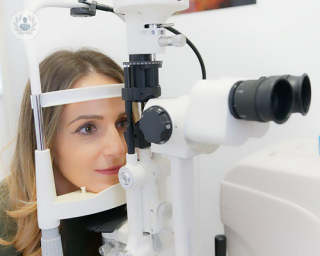

Understanding diabetic retinopathy: A comprehensive guide for patients
By Dr Ashraf Khan
2025-01-28
Diabetic retinopathy is a significant concern for individuals living with diabetes, as it poses a potential threat to vision. In this article, leading consultant ophthalmic surgeon Dr Ashraf Khan explores the basics of diabetic retinopathy, including the causes, prevention strategies, and available treatment options. See more
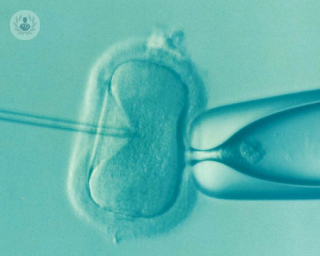

Exploring IVF: Your concerns and questions answered
By Dr Anu Chawla
2025-01-28
Are you considering IVF, but have so many questions you don’t know where to start? Leading senior fertility specialist Dr Anu Chawla is here to help. She looks at ten of the most popular concerns regarding IVF in this informative article, including costs, success rates and the overall process. See more
Experts in Intravitreal injection
-
Mr Jonathan Dowler
OphthalmologyExpert in:
- Intravitreal injection
- Retinal tear
- Angiography
- Epiretinal membrane
- Macular degeneration (AMD)
- Diabetic retinopathy
-
Mr Praveen Patel
OphthalmologyExpert in:
- Macular degeneration (AMD)
- Retina
- Retinal vein occlusion
- Diabetic retinopathy
- Macular oedema
- Intravitreal injection
-
Mr Maan Kasmiya
OphthalmologyExpert in:
- Cataracts
- Macular degeneration (AMD)
- Intravitreal injection
- Laser eye surgery
- Diabetic retinopathy
- Chalazion
-
Dr Gabriella De Salvo
OphthalmologyExpert in:
- Macular degeneration (AMD)
- Retinal vein occlusion
- Myopia
- OCT (optical coherence tomography)
- Intravitreal injection
- Inherited Retinal Diseases
-
Dr Rupal Morjaria
OphthalmologyExpert in:
- YAG laser capsulotomy
- Cataract surgery
- Intravitreal injection
- Macular oedema
- Macular degeneration (AMD)
- Diabetic retinopathy
- See all

Syon Clinic - part of Circle Health Group
Syon Clinic - part of Circle Health Group
941 Great West Rd, Brentford TW8 9DU
No existe teléfono en el centro.
By using the telephone number provided by TOP DOCTORS, you automatically agree to let us use your phone number for statistical and commercial purposes. For further information, read our Privacy Policy
Top Doctors

Laser Vision
Laser Vision
Prema Compass Road North Harbour Business Park Portsmouth PO6 4RP
No existe teléfono en el centro.
By using the telephone number provided by TOP DOCTORS, you automatically agree to let us use your phone number for statistical and commercial purposes. For further information, read our Privacy Policy
Top Doctors

London Medical
London Medical
49 Marylebone High Street, W1U 5HJ
No existe teléfono en el centro.
By using the telephone number provided by TOP DOCTORS, you automatically agree to let us use your phone number for statistical and commercial purposes. For further information, read our Privacy Policy
Top Doctors
-
Syon Clinic - part of Circle Health Group
941 Great West Rd, Brentford TW8 9DU, West LondonExpert in:
- Allergies nose and ears
- Allergy Dermatitis
- Allergy
- Clinical analysis
- Anxiety
- Digestive
-
Laser Vision
Prema Compass Road North Harbour Business Park Portsmouth PO6 4RP, HavantExpert in:
- Cataracts
- Laser eye surgery
- ICL lens implants
- Ophthalmology
- Keratoconus
- Lens replacement
-
London Medical
49 Marylebone High Street, W1U 5HJ, Central LondonExpert in:
- Cardiology
- Adult Diabetes
- Child Diabetes
- Endocrinology
- General practice
- Ophthalmology
- See all
- Most viewed diseases, medical tests, and treatments
- Visual impairment
- Diabetic retinopathy
- Retina
- Presbyopia
- Nystagmus
- Myopia
- Hyperopia (farsightedness)
- Eye examination
- Blepharitis
- Astigmatism






